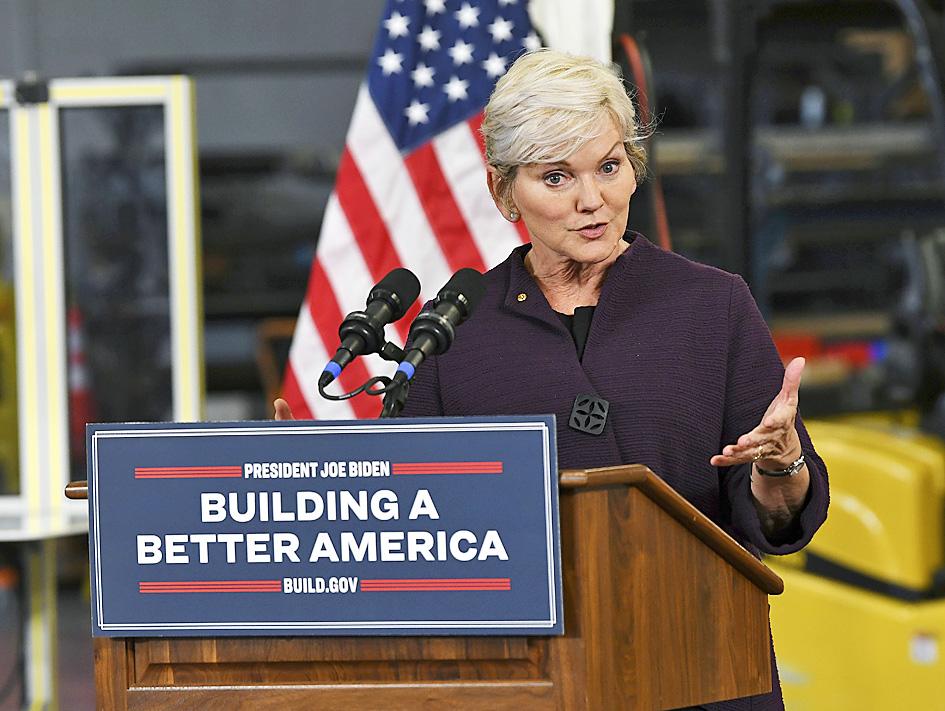US President Joe Biden’s administration is to allocate more than US$3 billion in infrastructure funding to finance electric vehicle (EV) battery manufacturing, US officials said on Monday.
The funds are to be allocated by the US Department of Energy from the US$1 trillion infrastructure bill Biden signed last year.
Among the initiatives would be processing of minerals for use in large-capacity batteries and recycling those batteries, the agency said in a statement.

Photo: AP / Detroit News
Biden wants half of vehicles sold in the US to be electric by 2030, a goal he hopes would boost unionized manufacturing jobs in key election battleground states, thwart Chinese competition in a fast-growing market and reduce climate-changing carbon emissions.
The administration is also positioning the measures as a step to secure energy independence and cut long-term inflationary pressures exacerbated by Russia’s Feb. 24 invasion of Ukraine.
“As we face this Putin price hike on oil and gas, it’s also important to note that electric vehicles will be cheaper over the long-haul for American families,” Mitch Landrieu, the White House infrastructure coordinator, told reporters in a briefing, referring to Russian President Vladimir Putin.
Ford Motor Co welcomed the announcement.
“This investment will strengthen our domestic battery supply chain, create jobs and help US manufacturers compete on the global stage,” Ford general counsel Steven Croley said in a statement. “We have a moment of opportunity to own this technology here in the US, and investments like the one announced today will help us get there.”
The latest funding would help establish and retrofit battery factories. The infrastructure law also allocated billions of US dollars more for the government to purchase electric buses and install EV chargers.
The administration has been collaborating with manufacturers, including Tesla Inc chief executive Elon Musk, General Motors Co CEO Mary Barra and Ford CEO Jim Farley.
However, the funds would not go toward developing new domestic mines to produce the lithium, nickel, cobalt and other high-demand minerals needed to make those batteries. Some of those projects face local opposition and are tied up in Biden administration environmental and legal reviews.
“These resources are about battery supply chain, which includes producing, recycling critical minerals without new extraction or mining,” Biden’s national climate adviser Gina McCarthy said. “So that’s why we’re all pretty excited about this.”
Biden in March invoked the Cold War-era Defense Production Act to support the production and processing of those minerals. Last week, he requested funding to support that initiative as part of a US$33 billion package on Ukraine-related initiatives.

MULTIFACETED: A task force has analyzed possible scenarios and created responses to assist domestic industries in dealing with US tariffs, the economics minister said The Executive Yuan is tomorrow to announce countermeasures to US President Donald Trump’s planned reciprocal tariffs, although the details of the plan would not be made public until Monday next week, Minister of Economic Affairs J.W. Kuo (郭智輝) said yesterday. The Cabinet established an economic and trade task force in November last year to deal with US trade and tariff related issues, Kuo told reporters outside the legislature in Taipei. The task force has been analyzing and evaluating all kinds of scenarios to identify suitable responses and determine how best to assist domestic industries in managing the effects of Trump’s tariffs, he

TIGHT-LIPPED: UMC said it had no merger plans at the moment, after Nikkei Asia reported that the firm and GlobalFoundries were considering restarting merger talks United Microelectronics Corp (UMC, 聯電), the world’s No. 4 contract chipmaker, yesterday launched a new US$5 billion 12-inch chip factory in Singapore as part of its latest effort to diversify its manufacturing footprint amid growing geopolitical risks. The new factory, adjacent to UMC’s existing Singapore fab in the Pasir Res Wafer Fab Park, is scheduled to enter volume production next year, utilizing mature 22-nanometer and 28-nanometer process technologies, UMC said in a statement. The company plans to invest US$5 billion during the first phase of the new fab, which would have an installed capacity of 30,000 12-inch wafers per month, it said. The

Taiwan’s official purchasing managers’ index (PMI) last month rose 0.2 percentage points to 54.2, in a second consecutive month of expansion, thanks to front-loading demand intended to avoid potential US tariff hikes, the Chung-Hua Institution for Economic Research (CIER, 中華經濟研究院) said yesterday. While short-term demand appeared robust, uncertainties rose due to US President Donald Trump’s unpredictable trade policy, CIER president Lien Hsien-ming (連賢明) told a news conference in Taipei. Taiwan’s economy this year would be characterized by high-level fluctuations and the volatility would be wilder than most expect, Lien said Demand for electronics, particularly semiconductors, continues to benefit from US technology giants’ effort

‘SWASTICAR’: Tesla CEO Elon Musk’s close association with Donald Trump has prompted opponents to brand him a ‘Nazi’ and resulted in a dramatic drop in sales Demonstrators descended on Tesla Inc dealerships across the US, and in Europe and Canada on Saturday to protest company chief Elon Musk, who has amassed extraordinary power as a top adviser to US President Donald Trump. Waving signs with messages such as “Musk is stealing our money” and “Reclaim our country,” the protests largely took place peacefully following fiery episodes of vandalism on Tesla vehicles, dealerships and other facilities in recent weeks that US officials have denounced as terrorism. Hundreds rallied on Saturday outside the Tesla dealership in Manhattan. Some blasted Musk, the world’s richest man, while others demanded the shuttering of his